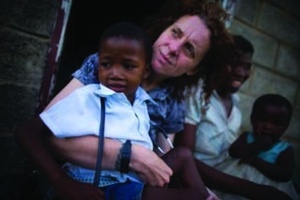Time for White House to step up on TB
The World Health Organization just released new data showing tuberculosis kills more people than even HIV/AIDS, and it called multidrug-resistant TB a public health crisis.
The news brought to my mind vivid memories from my work as a
physician in southern Africa.
I cannot forget seeing
an 8-year-old boy as he crawled outside to play with his
friends. Being on all fours was not part of the fun but his only
means of mobility. An infection in his knees, caused by
multidrug-resistant tuberculosis, left him unable to walk or
stand.
While TB usually affects the lungs, in many
children it occurs in other parts of the body.
Resilient
in the face of his illness, he looked to the sky with a shy grin
as the other children shouted "crab, crab, come and get us,
crab." But the playful laughter was then replaced by silence:
The young boy was killed by MDR-TB, and his sister and mother
are also ill with disease.
In my 20 years of
experience in treating children with this disease with Partners
in Health, the Sentinel Project and others, this case, in the
African nation of Lesotho, was one of the most heartbreaking.
Due
to a lack of appropriate TB diagnostic tests and medications,
this child was sick for months before the cause of his fevers
and swollen knees became clear.
Even when the
diagnosis was made, he was referred from facility to facility
before a provider skilled enough to treat him could be located.
The transportation cost for just one visit was more than the
family's entire monthly income.
He wept silently when
receiving his painful daily injections. Watching his small frame
heave and struggle to swallow the multiple, bitter pills was
almost too much for his mother to bear, and at times they simply
both gave up.
Could this only happen in a place like
Lesotho? Actually, there are about 100 cases of MDR-TB diagnosed
in the United States each year. These lead to an additional
1,000 exposures and more than 300 infections with MDR-TB over a
two- to three-year period, according to the U.S. Centers for
Disease Control and Prevention.
In the United States,
a case of MDR-TB can cost $400,000 to treat. Patients must take
toxic medication daily for two to three years, often causing
permanent hearing loss and other side effects.
In
2009, a teacher in a Laguna Beach, Calif., elementary school
went to work not knowing she had MDR-TB, inadvertently infecting
31 children. Last year in Florida, 36 TB cases were found to be
resistant to at least one TB drug and 10 cases of MDR-TB were
confirmed, according to the Florida Department of Health. In
Massachusetts, we already have seen six cases of MDR-TB so far
this year.
Globally, the number of cases among
children is bound to grow. Once on the right treatment, a
patient usually becomes noninfectious, but most people with the
disease are not receiving treatment, thus making spread to
children more likely.
There is some good news. The
White House is developing a National Action Plan for Combating
Drug Resistant TB, which would put us on course to eliminate the
threat of MDR-TB through prevention and treatment with promising
new medications now becoming available. Some 560,000 people with
drug-resistant TB would receive treatment under the plan over a
five-year period. Last summer, 10 U.S. senators wrote to the
president commending him for taking this initiative.
Unfortunately,
many TB experts worry the president may fail to propose the
funding increase required to implement the plan, because in
recent years he has proposed not increases but rather
substantial cuts to global TB funding. I have signed an appeal
to the president, along with 600 other physicians and
scientists, including 21 based in Florida, urging him to launch
his plan without delay and propose the needed funding.
President
Barack Obama has a chance to add to his legacy on global health
by confronting the tuberculosis threat. For the sake of the
children I am treating for MDR-TB and families affected by this
disease, we must not delay. We cannot afford an action plan that
just gathers dust on the shelf.
By Dr. Jennifer Furin
Dr. Jennifer Furin is senior lecturer at Harvard Medical
School, Department of Global Health and Social Medicine.
Source:
Tampa Bay Times


